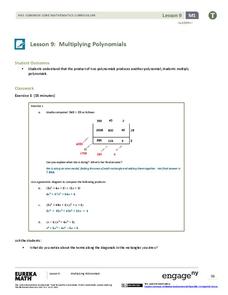Curated OER
Grade 5: Multiple Towers
Fifth graders use interlocking cubes to build towers to represent factors of numbers and place the towers in the appropriate places on a Tower chart in order to look for patterns. They work in partner groups, and finish by writing...
Curated OER
Divisibility Rules
Sixth graders strengthen their knowledge of the divisibility rules. Students access that mental math can be faster than the calculator for certain types of problems.
Students can make generalizations and discover patterns in finding the...
Curated OER
Introducing the Concept Prime Factors
Fifth graders identify the prime factorization for 48 using different sets of factors. They find the prime factorization for 60.
Curated OER
Greatest Common Factor: Using the Factor Tree
Students find the greatest common factor of two numbers. For this algebra lesson, students use prime factorization to find their factor to simplify equations. they create a factor tree to find the factors of composite numbers.
Curated OER
Exponential Expressions - Perfect Squares, Square Roots
Color tiles are used to model perfect squares. Alone or in pairs, middle schoolers will find patterns. Afterward, the relationship between perfect squares and roots will be discussed as a whole class.
Curated OER
Divisibility Rules Using Scientific Calculators
Young learners apply divisibility rules to determine if a number is a factor of another number. They discuss what numbers are factors of another number and identify patterns using divisibility rules.
Curated OER
Prime Factors
Fifth graders review the concept of prime factorization. Then, they use the rules for divisibility and other notions to find the prime factorization of unfamiliar numbers. They solve problems in a whole class setting.
EngageNY
Equivalent Rational Expressions
Rational expressions are just fancy fractions! Pupils apply fractions concepts to rational expressions. They find equivalent expressions by simplifying rational expressions using factoring. They include limits to the domain of the...
Willow Tree
Multiplying Polynomials
Make two parts into a whole. Scholars learn to multiply polynomials to create a simplified polynomial expression. Polynomials include monomial, binomials, and trinomials.
Curated OER
Factors, Divisibility, and Relatively Prime
Seventh graders explore the concept of divisibility. In this divisibility lesson, 7th graders use divisibility rules to find factors of numbers. Students create foldables to illustrate divisibility rules.
Curated OER
Math: Am I Prime?
Seventh graders determine the difference between prime and composite numbers. On a Website, they discover a method to identify all the prime numbers up to 100 and also complete several online activities. Once they have discussed the...
Curated OER
Prime and Composite
Middle schoolers explore prime and composite numbers. In this prime and composite numbers lesson, students discover the difference between prime and composite. Middle schoolers practice as a class then do independent practice.
Curated OER
Square Roots, Number Classification, Ordering & Graphing
Ninth graders identify numbers as rational or irrational. Using calculators estimation, and factoring methods, 9th graders compute the square root of numbers. They graph numbers in sequential order and round numbers integers to the...
Curated OER
Divisibility
In this math worksheet, students examine the 20 numbers in order to test their divisibility. The rules of divisibility are given at the top of the page.
Curated OER
Divisibility Rules Study Guide
In this mathematics worksheet, 4th graders write the divisibility rule for each factor given. Then they practice the rules by dividing the numbers listed by each factor and place a check mark in the box if it is a factor of the number.
Curated OER
Factor Trees
Students practice factor trees. They use Paint in Microsoft Word to create factor trees. After completion, they use a calculator to check their answers. In addition, they visit websites to reinforce the information.
Curated OER
Systems of Equations - Week 6
In this systems of equations worksheet, students solve systems of equations simultaneously. They read story problems, write systems of equations. This two-page worksheet contains eight problems.
Curated OER
Chapter 5 Solving Problems
High schoolers explore the concept of algebra topics. In this algebra topics lesson, students solve linear and quadratic equations. High schoolers solve systems and factor equations. Students practice problems involving perfect square...
Curated OER
Worksheet Chapter 5 College Prep Algebra
In this algebra worksheet, students evaluate algebraic expressions, simplify exponents, write numbers in scientific notation, perform division of equations, and find the area of given problems. This worksheet contains 75 problems and an...
Curated OER
Factor Race
Students practice finding factors for numbers. In this factor lesson plan, students draw a card and list all the factors for that number. Each person scores points depending on the number of factors they have written correctly.
Curated OER
Simplify Expression Using the Order of Operations
Allow learners to explore both the right and wrong way of completing equations with the order of operations. They discuss how the order in which operations are performed affects the outcome of a problem. A fun "trick" using order of...
Curated OER
Factoring Trinomials
Young scholars factor trinomials using specific steps. In this algebra instructional activity, students factor polynomials following the steps on a smart instructional activity. They review important vocabulary to help with solving the...
Virginia Department of Education
Quadratic Equations
Review the multiple methods of solving quadratic equations through an analysis of the discriminant. Scholars use the discriminant to determine the best solution method and then solve various equations. As a challenge, learners build...
Chicago Teachers Union Quest Center
Factored Form of a Quadratic Function
Build upon linear functions to learn about quadratics. The lesson introduces the concept of zeros for quadratic functions and makes the connection to the linear factors of the function. It presents quadratics in both graphical and...























